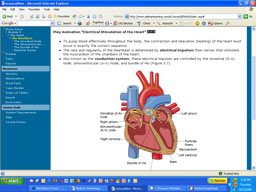Now that you’ve decided to enter the healthcare field, where do you start? Many experts state that taking an anatomy and physiology course is critical for long-term success. Before you decide to move forward and start an online anatomy and physiology course, it’s best to understand why this foundation of knowledge is vital to your medical career. So why is anatomy and physiology important? Let’s take a closer look.
Understanding Human Development
It’s helpful to have an intimate knowledge of human development and how the body grows and changes throughout life. Working with children is very different from working with older adults, and a background in anatomy and physiology can help you better understand the individual needs.
Knowing How Systems Interact
Beyond the individual organs and systems, it is also important to understand how the various aspects of the human body work together. The circulatory system, the respiratory system, the lymphatic system, and more all play a part in human health and the interactions can be healthy or unhealthy.
By understanding how the systems interact, you can determine the proper care for each individual patient and their specific symptoms. With a foundation of anatomy and physiology, you will have the building blocks to make the proper decisions and provide accurate and quality care.
Staying Up To Date on Research
Of course, the study of anatomy and physiology is not static. New innovations in science and medicine change our understanding of the human body all the time. Starting with the proper foundation provided by an anatomy and physiology course is a stepping-stone in continuing an education in the medical field.
Once you have an understanding of the basic systems and functions of the human body, staying up to date on new research will be significantly easier. Online courses, taken at your own pace, can give you the tools you need to better understand these concepts.
Developing Precise Skills
Ultimately, your medical career will be reliant on your ability to learn and execute tasks with precision. With a greater understanding of the way the systems of the body interact, a medical professional will be able to successfully determine the problem and conclude a more accurate solution. There is a range of potential career opportunities for someone with a strong background in anatomy and physiology, from clinical work to laboratory research.
Begin an Exciting Career in Healthcare
These fundamental building blocks of medical science will give you the opportunity to make a difference in the lives of others throughout your career. Beginning your healthcare career can be intimidating but starting with a foundational understanding of anatomy and physiology will broaden your educational and career prospects in a fast-growing field.
Do you want to take anatomy courses online to begin your journey toward a career in medical science? Contact Corexcel to learn what we have to offer.



